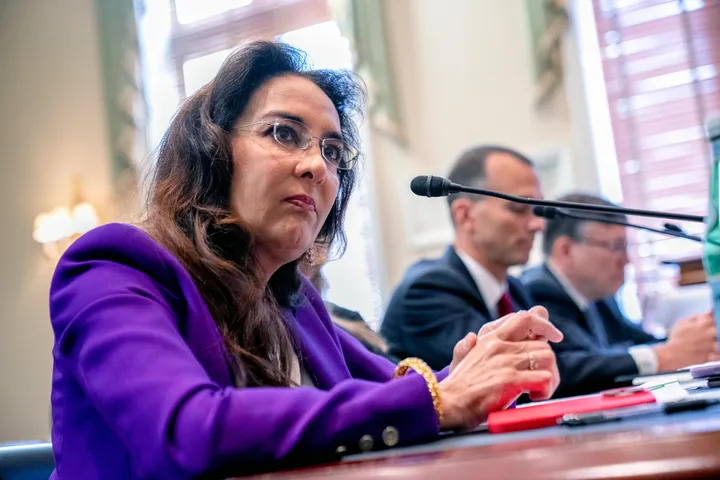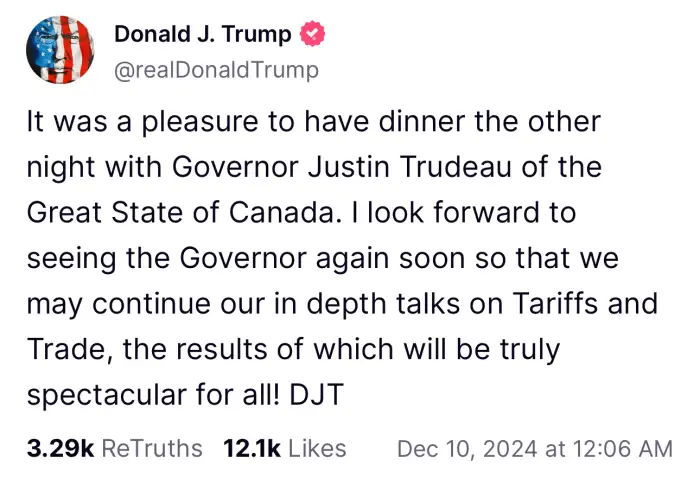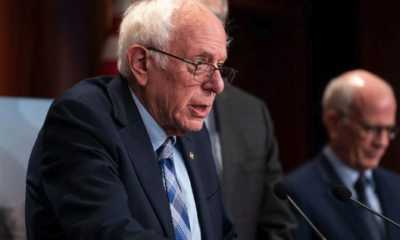News
Shocking! The GOP Abandoning Trump’s Agenda

Republicans from Capitol Hill to the White House are battling internally over the basic tenets of Donald Trump’s first 100-day agenda — including which priorities should come first — in a preview of the landmines looming over the GOP’s ambitious agenda despite controlling all of Washington.
John Thune, the incoming Senate majority leader, is preparing to move quickly on two of the president-elect’s top issues — border security and energy production — while punting on a tax bill until later in 2025. But that’s caused deep anger among some senior House members, who warn that waiting on the tax issue could mean killing it altogether.
And there’s a push among some conservative Republicans to toss all of Trump’s priorities into one catchall bill. But GOP critics warn that doing so would cause such a plan to collapse under its own weight — especially given the complexities of tax policy coupled with tight margins in the House, where one Republican defection could scuttle the entire agenda.
The GOP will operate with one of the smallest congressional majorities in history while contending with major deadlines like averting a government shutdown as early as March and a potentially catastrophic debt default next year. And with just six weeks until Inauguration Day, Republicans across the party are growing anxious over how to deliver on Trump’s priorities in some of the toughest possible political conditions.
”This is a once in a generational opportunity to do a lot of things,” said Sen. John Cornyn, a senior Texas Republican who served as the whip in Trump’s first term. “And I am not sure everyone is on the same page.”
The clash comes as House and Senate GOP leaders fully recognize they have little time to use the political capital Trump is eager to expend from his election victory.
Yet while many Senate Republicans argue a narrow border and energy policy bill would help deliver an early win for Trump, many on the House side worry about squandering momentum for the rest of Trump’s agenda — namely, taxes.
“I am worried that everyday Americans will face a tax increase if Congress doesn’t act appropriately,” said Rep. Jason Smith, a powerful chairman who leads the GOP’s tax-writing panel and wants Congress to focus on taxes in the first package. “The president campaigned on it. It’s a priority. They should listen to the 76 million Americans who asked for tax relief.”
At a private meeting of the House Ways and Means Committee on Thursday, Smith’s fellow GOP tax-writers agreed. Republicans in the room stressed that tax policy shouldn’t be left out because Congress might not get a “second bite at the apple,” according to multiple people familiar with the discussions.
Despite one-party rule, there will still be limited chances to enact new policy through Congress without bipartisan support. Typically, any senator can filibuster legislation, which would require 60 votes to overcome in a Senate where Republicans will hold a 53-47 majority.
Republicans are looking at passing the bill using the budget process, known on Capitol Hill as reconciliation, which allows bills to be approved by a simple majority (51 votes) in the Senate. But approving each reconciliation bill requires two steps and a marathon series of votes, and the legislation must pass muster with strict budget rules in the Senate.
Typically reconciliation bills are attempted once a year during single-party rule in Congress. Smith argues history hasn’t been kind to majorities trying to do it twice — especially since Republicans will hold a 220-215 House majority and will lose three more seats due to resignations early in the new year.
“Like I said, if you look at history over the last 25 years, there’s not been two reconciliations that have been signed into law in the same year, and why would we think in a (220-215) majority … that we would over perform?” Smith told CNN.
But many senators argue that jumpstarting Trump’s term with a border bill — packed with widely popular GOP ideas — is a better move politically than risking a dragged-out tax battle.
“On tax, we always knew it was going to be very complicated. We want to do it right,” said Sen. Mike Rounds, a South Dakota Republican up for reelection in 2026. “I have no objections to doing that secondary as long as we are working on it at the same time. It is going to take longer to get it done, but we want to do it correctly.“
Sen. Thom Tillis, a Republican from North Carolina who is also up for reelection in two years, added: “We won saying we want to solve the border so I think it’s good policy and good politics to say he wants to lead with it. When we do the tax reconciliation, it’s gonna be big and complex.”
Sen. Cynthia Lummis, the Wyoming Republican who used to serve in the House, said passing their agenda “will be complicated.”
“Jason Smith doesn’t think that’s possible to take more than one bite of the apple,” she said. “And he may be right in the House. He has a pretty good read on how the House rolls. The House and the Senate don’t roll the same.”
Johnson in the middle
One of the most influential voices in the debate will be Speaker Mike Johnson, the soft-spoken GOP leader who will have zero votes to lose on the floor early next year — tied with the narrowest House margin in history as the result of expected vacancies when some members leave to join the Trump administration.
In an interview with CNN, Johnson didn’t take a position on how to sequence the bills, arguing that “we all have the same priorities” and indicating the talks with Senate leaders and Trump’s team were still taking shape.
“Look, I can make a case for different sequences of how we do all these priorities, but my job here is to build consensus,” Johnson said. “So we’re working to do that in a bicameral fashion.”
Asked about the challenges of passing the bills with no margin for error, Johnson quipped: “It’s going to be very easy. We know how to work with a small majority.”
With the razor-thin majority, House Republicans may have an unusual amount of leverage in the typically Senate-driven process of crafting a filibuster-proof legislative package. (For President Joe Biden’s own version, party leaders were repeatedly forced to rewrite their bill thanks to Sen. Joe Manchin. For Trump, the trouble could come from the House chamber instead.)
“They have a narrower margin than even we do, and so we may have to defer to the House a little bit,” Lummis said of the House, where she served eight years.
“It’s really unusual,” the Wyoming Republican said. “It might take a new attitude adjustment over here.”
GOP Rep. Kevin Hern, another Republican on the tax-writing panel, said he believes Johnson and other fellow House members will help make a strong case not to leave the tax issue behind.
“You only get one bite at the apple and taxes are important to all Americans,” Hern said. “We understand the politics on this side of the House. I think the speaker, the Senate leader and our chairmen are working on that, to better understand how the House works.”
Most of the GOP’s discussions on these bills have so far taken place at the leadership level. But Johnson plans to bring his members into the debate immediately after members’ swearing-in next month for the new Congress. Johnson will hold a Saturday members’ session on Trump’s legislative plans on January 4, according to people familiar with the plans.
“I think what is going to matter the most is whether, between the two of them, Mike Johnson and Donald Trump can discipline whatever the number is and keep them united,” said Sen. Kevin Cramer, a Republican from North Dakota.
GOP tries to avoid 2017 repeat
Top Hill Republicans have spent nearly a year trying to make sure Trump’s first-100-day agenda avoids the fate it had his first term, when his top priority — repealing the Affordable Care Act, otherwise known as Obamacare — failed in dramatic fashion.
A group of House GOP chairmen first sat down in May to plot this massive package under a potential Trump presidency, according to a person familiar with the discussions. Since then, those Republicans have been drafting bills and compiling spreadsheets of ideas on how to pay for their plans.
Republicans on the House Ways and Means Committee and Budget Committee have spent months preparing to manage what is expected to be an arduous fight to pass another tax bill, which will extend some of the provisions from the 2017 tax bill but could also include new provisions expected to cost billions. Trump has floated not taxing the tips workers make as well as not taxing Social Security payments to seniors, both of which would increase the price tag of any potential tax bill.
Meanwhile, the Budget Committee has been focused on options to offset the cost of some of those provisions.
A source familiar with the discussions says the committee has begun to identify potential spending cuts to pay for the tax bill, including repealing Biden’s executive order on student loans; issuing work requirements for able-bodied, childless working age recipients of Medicaid; and repealing some of the green energy tax incentives from Biden’s Inflation Reduction Act. But, as with any new spending cut, ensuring Republicans are united could be a massive lift with such a narrow majority.
“My experience has been trying to convince people to cut it, it’s kind of like going to heaven,” GOP Sen. John Kennedy of Louisiana said of spending cuts. “Everybody’s ready to go to heaven, but nobody’s willing to take the trip.”
But even the GOP’s push to pass a border-focused bill may not be easy.
Rep. Andrew Clyde, a member of the House Freedom Caucus who is a close Trump ally, told CNN that Republicans shouldn’t consider anything less than the House’s own hard-line border package, known as HR 2, even though such a plan could run afoul of the Senate’s budget rules.
“I think HR 2 would be the floor of what we need,” Clyde said. And he added that he wants to see at least some tax policy in the package: “I think we can probably do a little bit of the tax aspect of it,” specifically citing Trump’s pledge to end taxes on tips.
But even some veteran Senate Republicans warned that passing two reconciliation bills will be a tall order.
“I think it’s going to be difficult,” said Sen. Susan Collins of Maine, the incoming chairwoman of the Senate Appropriations Committee.
News
Trump Nominates Conservative Lawyer Harmeet Dhillon To Lead DOJ Civil Rights Division

Harmeet Dhillon was chosen by the president-elect to replace Kristen Clarke on the Justice Department’s civil rights efforts.
President-elect Donald Trump announced on Monday that he plans to nominate a conservative California attorney to lead a critical division of the Department of Justice.
Harmeet Dhillon, a former vice chairwoman of the California GOP and a national committeewoman for the Republican National Committee, was selected by Trump to serve as assistant attorney general for civil rights at the Justice Department. She would replace Kristen Clarke, who became the first woman and first Black woman to run the division in 2021.
Trump, who described Dhillon as one of the “top Election lawyers” in the country in his Truth Social announcement, said that she would have a large role in voting rights enforcement.
“Throughout her career, Harmeet has stood up consistently to protect our cherished Civil Liberties, including taking on Big Tech for censoring our Free Speech, representing Christians who were prevented from praying together during COVID, and suing corporations who use woke policies to discriminate against their workers,” he wrote.
Dhillon combated stay-at-home orders during the COVID-19 pandemic. She filed several lawsuits against government-level regulations, arguing there was overreach. The lawsuits Dhillon filed came after Democratic California Gov. Gavin Newsom became the first governor to issue statewide stay-at-home orders to shut down nonessential activities and interests to combat the spread of the coronavirus.
In 2018, Dhillon founded the conservative nonprofit The Center for American Liberty, which has filed lawsuits challenging vaccine requirements and trans-inclusive school policies. Most notably, Dhillon currently represents Chloe Cole, a young activist who sued Kaiser Permanente in California after she detransitioned from male to female. Cole has rallied alongside Republican politicians and conservative media figures, and has testified in support of dozens of state laws restricting access to gender-affirming care for trans youth.
Dhillon is highly critical of blue states that aim to uphold and protect rights for transgender people in light of ongoing legislative attacks. She said Maine’s “shield” law, which protects reproductive health care providers and trans people, is “unconstitutional” and expressed concerns about future protections in California.
A staunch opponent of abortion herself, the attorney also unsuccessfully represented anti-abortion activist David Daleiden, who in 2016 used a fake driver’s license to pose as a biomedical company executive and tried to buy fetal tissue from Planned Parenthood, in an effort to accuse the health care provider of selling tissue for profit.
Dhillon, who was born in India and is a practicing Sikh, has faced pushback from fellow Republicans due to questions of her faith. After she announced in 2022 that she would challenge RNC Chair Ronna McDaniel for her position, several members of the RNC circulated a video of Dhillon opening a 2016 Republican National Convention with a Sikh prayer. In a letter to Alabama Republicans in 2023 responding to the incident, Dhillon addressed concerns about her faith and slammed McDaniel’s leadership. Alabama Republican Chris Horn questioned how Dhillon’s religion would impact policy to NBC. McDaniel condemned attacks on religion but told Politico her allies questioned how Dhillon’s faith would impact the party.
Last year, former Fox News host and conservative political commentator Tucker Carlson hired Dhillon to represent him in a gender discrimination lawsuit by his former producer, Abby Grossberg. The ensuing settlement resulted in Fox paying Grossberg $12 million.
“I’m extremely honored by President Trump’s nomination to assist with our nation’s civil rights agenda,” Dhillon said in a post on X (formerly known as Twitter). “It has been my dream to be able to serve our great country, and I am so excited to be part of an incredible team of lawyers led by @PamBondi. I cannot wait to get to work!”
News
Trump’s Utterly Absurd Take On Birthright Citizenship Involves Walking Infants

The president-elect appeared very confused about how American citizenship is conferred.
In a freewheeling interview with NBC News Sunday, President-elect Donald Trump offered a head-scratching explanation for his plan to wage an attack on birthright citizenship.
“Did you know, if somebody sets a foot — just a foot, one foot, you don’t need two — on our land, congratulations, you are now a citizen of the United States of America,” Trump said, when discussing birthright citizenship.
“Yes, we’re going to end that, because it’s ridiculous,” he added.
Trump appeared to describe a hypothetical scenario in which a woman would give birth to an infant who — either capable of walking at birth or helped along by someone eager to win a bet — would set one foot on American soil and the other in either Mexico or Canada.
It is also possible Trump was imagining an infant hopping or standing on one leg. Neither scenario is plausible.
Trump also repeatedly asked whether the interviewer, Kristen Welker of “Meet the Press,” knew that the United States was the only country that conferred citizenship by birthright.
“We’re the only country that has it, you know,” Trump said. “You know we’re the only country that has it.”
Birthright citizenship is commonly recognized in the Americas, including in Canada and Mexico. Also known by its Latin legal term as “jus soli,” it is the concept of conferring citizenship by birth in a given country. Most countries instead recognize “jus sanguinis,” which instead confers citizenship based on the nationality of a person’s parents.
Welker did not challenge Trump’s utterly wrong description of how birthright citizenship works or that the United States is not alone in recognizing it. But she asked whether Trump intended to enact his proposed change through executive action.
“Well, if we can, through executive action,” Trump said. “I was going to do it through executive action, but then we had to fix COVID first, to be honest with you.”
Birthright citizenship is protected by the 14th Amendment to the Constitution. The president cannot use executive action to overturn a constitutional amendment, though legal experts expect the Trump administration to challenge the long-settled legal interpretation through the courts.
Trump has spent significant time in southern Florida, which is home to a large Cuban-American community.
He likely came up with this weird description of birthright citizenship by free-associating the issue with the now-defunct policy of allowing Cuban migrants to stay within the United States and pursue citizenship upon touching American soil. The policy was known as “wet-foot, dry-foot.”
During this year’s presidential campaign, Trump repeatedly described immigrants as coming from jails and mental institutions. He was likely resurrecting assertions he heard during the era of the Mariel boatlift four decades ago.
News
Trump Trolls Canadian Prime Minister Justin Trudeau, Stirs Controversy

Trump mocks the United States’ northern ally
In a post just after midnight on Truth Social, Trump took aim at Canadian Prime Minister Justin Trudeau with a mocking reference, calling him “Governor Justin Trudeau of the Great State of Canada.”

The comment, a throwback to Trump’s past suggestion that Canada might become the 51st U.S. state if they can’t handle his tariffs, is an insult to both Trudeau and Canada.

Trump recently posted an AI image of himself looking into Canada as if to annex it. Trump’s midnight post, claiming to look forward to future discussions on tariffs and trade with “Governor Trudeau,” further stoked tensions with a key ally and makes one question his diplomatic judgment.
Trump’s post undermines the United States’ relationship with Canada. Calling the Canadian leader a “Governor” belittles the sovereignty of a close neighbor and trading partner, and further feeds into the narrative of disrespect that Trump has often displayed toward foreign leaders.
The United States and Canada share deep economic, cultural, and geopolitical ties, and statements like this can jeopardize decades of cooperation. Trump is proving once again he will be an embarrassment to the United States.
-

 News11 months ago
News11 months agoGeraldo Rivera Slaps Trump Supporters With A Reality Check After Biden’s Pardon
-

 News11 months ago
News11 months agoBernie Sanders Flips The Script And Praises Trump Picks
-

 Uncategorized11 months ago
Uncategorized11 months agoNaked RFK Jr. Makes Cameo On Wife Cheryl Hines’ Social Media
-

 News11 months ago
News11 months agoPhoto of person of interest with the mask down was the “money shot,” police commissioner says
-

 News11 months ago
News11 months ago‘Banana Republic Stuff’: Mehdi Hasan Nails GOP Hypocrisy Over Trump’s Latest Move
-

 News11 months ago
News11 months agoBREAKING: Canada just stunned Trump with brutal news after holding an “emergency meeting.” This WON’T end well for Trump…
-

 News11 months ago
News11 months agoAnn Coulter Slams Controversial Trump Cabinet Nominee As ‘Sleazy’ Serial Adulterer
-

 News11 months ago
News11 months agoTrump Is Using “Unitary Executive” Theory in His Bid to Amass Supreme Power






